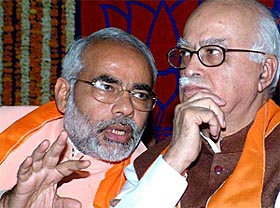How Narendra Modi tackled 71 questions by the SIT
The Tehelka magazine on Thursday published what everyone was curious to know — what questions were posed to chief minister Narendra Modi during his interrogation by the Supreme Court-appointed Special Investigation Team (SIT) on March 25, 2010, and what his responses were.
The details show how Modi resorted to selective facts, evasion, amnesia, outright lies and rhetoric during his questioning.
The interrogation began with inquiry officer AK Malhotra showing Modi the text of his inflammatory public speech at Becharaji in Mehsana on September 9, 2002, in the middle of Gujarat Gaurav Yatra, and asking him if the remarks referred to Muslims.
According to Tehelka, Modi, however, replied that the speech did not refer to any particular community or religion. He said it was a political speech, in which he tried to point out the increasing population. He also said that his speech had been distorted.
The CM described as baseless his alleged instructions to police and home department officials to allow Hindus to vent their anger in the wake of the Sabarmati carnage. He claimed that he had given categorical and clear cut instructions to maintain peace and communal harmony at any cost.
The SIT asked Modi as to who gave the call for Gujarat Bandh on February 28, 2002 and Bharat Bandh on March 1, and whether the bandhs were supported by the ruling party. In response, the CM said he had learnt that Gujarat bandh call was given by the VHP.
"However, I came to know from newspaper reports on February 28 that the bandh had been supported by the BJP," he claimed. Asked to explain his statement to a news channel on March 1, 2002, in which Modi described the violence as a chain of actions and reactions, the CM replied that he did not recollect his exact words.
He told the SIT that he had always appealed only for peace, and "had tried to convey to people to shun violence in straight and simple language".
Tehelka said that on being asked about his movements on February 28, 2002, Modi replied, "On the afternoon of February 28, I met the press, and informed about the announcement of an inquiry commission and also made an appeal to the public to maintain peace and communal harmony."
During the questioning, which continued till 1 am in the night, the SIT posed a total of 71 questions to Modi. Asked who took the decision of transporting bodies of victims of Sabarmati train carnage to Ahmedabad and on what basis, Modi said it was a collective decision. The CM said the decision was taken because most of the victims belonged to Ahmedabad and nearby places.
Asked about a meeting at his residence on February 27, Modi said that it was a law and order meeting attended by top officials. He also named the officials that were present at the meeting. He also said that Sanjeev Bhatt, the then DC (intelligence), was not present, as it was a high-level meeting.
However, Bhatt has claimed that he was indeed present in the meeting. Quizzed whether a decision was taken to allow ministers Ashok Bhatt and IK Jadeja to sit in the state control room and Ahmedabad city control room, respectively, which affected supervision of riot situation, Modi said no such decision had been taken. He also claimed that he did not have any knowledge that the two ministers were positioned in the control rooms, and that he learnt about it from media.
"It has been my and my government's approach right from the first day that a culprit is a culprit irrespective of his caste, creed, religion and socio-political background, as nobody is above law," he told SIT during his 9-hour grilling.
In response to a question about whether he knew ex-MP Ahsan Jafri, who was killed in Gulbarg society massacre, and if he had requested for help over phone, the CM said that he did not know Jafri. He claimed that he had not received any phone call from Jafri.
Modi described as absurd the allegations that the then sitting ministers Nitin Patel and Narayan Patel had led the violence, arson and sexual assault on women in Kadi and Unjha respectively.
The CM also answered in the negative when questioned if he had asked senior officials to brief the then ADGP RB Sreekumar prior to his deposition before Nanavati Commission, and to influence him to not make any deposition against the government.
Asked if he was in touch with Jaydeep Patel, Babu Bajrangi and Maya Kodnani during the riots, Modi said that he knew Kodnani and Patel, while Bajrangji was not known to him. He, however, said they had not contacted him over phone during the riots.
The SIT also asked Modi's reaction to the allegations that public servants who connived with those responsible for carnage were doubly rewarded and those who tried to uphold the law were punished by way of transfers and supersessions. In response, Modi said the allegations were vague, false and without any basis.






